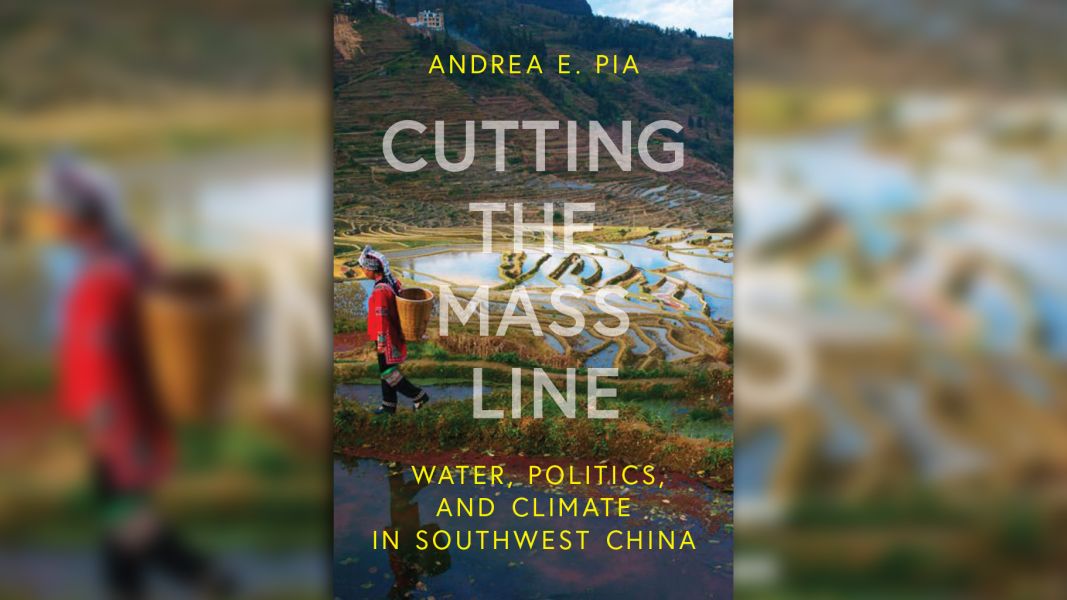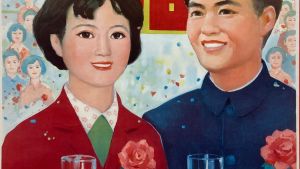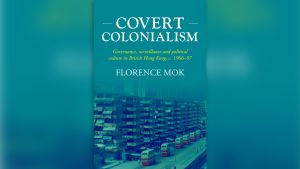
Cutting the Mass Line: A Conversation with Andrea E. Pia
China is experiencing climate whiplash: extreme fluctuations between drought and flooding that threaten the health and autonomy of millions of people. Set against mounting anxiety over the future of global water supplies, Andrea E. Pia’s Cutting the Mass Line: Water, Politics, and Climate in Southwest China (Johns Hopkins University Press, 2024) investigates the enduring political, technical, and ethical project of making water available to human communities and ecosystems in a time of drought, infrastructural disrepair, and environmental breakdown. Drawing on ethnographic fieldwork, archival materials, and statistical data, Pia brings readers into the inner workings of China’s complex water supply ecosystem and demonstrates how citizens’ efforts to keep access to local water sources and flourish in their communities redraw the political possibilities of climate and environmental collective action in unforeseen directions.
Loretta Lou: I am fascinated by your use of ‘lines’ as an analytical anchor, both literally and metaphorically, to analyse the multifaceted ways communities engage with water resources and environmental challenges. How did this idea come to you? Was there a Eureka moment?
Andrea E. Pia: As I explain in the introduction, this book is an odd object. It is the product of many years of fieldwork spent working side by side with Chinese water officials stationed in a drought-affected area in the southwest of the country coupled with years of activism on the decommodification and re-municipalisation of water services in my home region—a similarly climate-endangered area of northwest Italy. Unlike the scaremongering prevalent in much of the mainstream coverage of climate change and its impact on the global water cycle (acidification of seas, aridification of land, prolonged droughts alternating with apocalyptic floods, and ensuing mass migration), I wanted the book to offer a less hyperbolic account of the experiences of the people most affected. What do people already massively impacted by extreme oscillations of freshwater availability do to adapt to this ‘new water normal’ and how do they think about the socio-environmental change they witness? What can we learn from them as scholars, activists, workers, and inhabitants of a planet with a runaway climate, when the concentration of carbon dioxide in the atmosphere currently stands at 421 parts per million and counting?
I said the book is odd; it is also a study in political escapism. How can we—Chinese and Italians alike—escape the ecological cul-de-sac created by the energy history of the colonial North? How can we ensure that most of the world’s population has access to safe and reliable freshwater while maintaining an economic system that systematically extracts, degrades, and discards natural resources and pollutes air and water? This system imperils the livelihoods of current and future humans and non-humans.
I discovered that, especially among the water engineers and bureaucrats with whom I worked, thinking in terms of lines helped them address this question. Technically speaking, lines are useful for tracing water movement topographically and determining safety thresholds for service delivery—for instance, how pure water must be to be released from a water purification station back into the environment and how much groundwater can be extracted without impacting recharge rates? But discursively, lines also helped my interlocutors defer criticism (by periodically adjusting water efficiency benchmarks, for instance) while also envisioning new delivery workarounds that could balance efficiency with equity in distribution (for instance, by demonstrating the need for emergency water delivery in villages where estimated per capita water intake had suddenly dropped below a minimum quantity).
So, in the book, I think about lines alongside my interlocutors, but I try to do so in ways that can constructively expand or undermine their thinking. That is, more than a Eureka moment, when dealing with the mental gymnastics inaugurated by lines, I experienced countless Galileo moments (not being taken seriously). I spent most of my fieldwork insisting to my interlocutors that (water) sustainability shouldn’t only be seen—as they preferred to do—asymptotically or, in other words, as an indefinite linear progression towards a supposedly balanced state between economic and hydrological needs. In my view, sustainability is also about the fault lines created by this very logic: What is freshwater used for? Who gets more and who less? Which communities and places are prioritised and which are deprioritised in delivery? Who will shoulder the weight of the ‘new water normal’ and who will not?
In a way, this approach means retooling lines as a method for considering water and climate justice. There are principles, or lines, that one is unwilling to cross and others that one is willing to defend with one’s body. The practice and history of Italian water activism helped me considerably here. It not only helped me engineer for my interlocutors a new horizon for a notion of sustainability that could also be seen as just; it also helped me maintain a Galilean optimism in this effort. Despite my interlocutors’ stubborn defence of their hydro-social world view, I kept faith in the goodness of my interpretation. The book shows how this attitude ultimately paid off, ethnographically speaking.
LL: It is interesting that, as a scholar-activist project, you were hosted mainly by the Water Service Office (水务所). We understand that this kind of arrangement is very common and expected in China. How did you navigate the different power structures and relationships as a scholar-activist in this dynamic? You mentioned that you were not afraid of ‘quarrelling or openly disagreeing’ with your interlocutors. I am sure you were not! Tell us some interesting stories about this.
AEP: A Water Service Office (WSO) is the lowest administrative echelon in a multilayered, intersecting, and sometimes fragmented bureaucracy that supervises the allocation, distribution, and use of freshwater in the People’s Republic of China (PRC). In 2018, some of the environmental policy functions proper to the Ministry of Water Resources (水利部) were transferred to the newly created Ministry of Ecology and Environment (生态环境部), including responsibility for water function zoning and watershed protection. However, at the time of my fieldwork, the WSO was still primarily responsible for the domestic and agricultural use of freshwater for an inter-ethnic community of about 100,000 people on the Yunnan–Guizhou Plateau—one of 26 similar offices in the area.
I would not say that my stay in the WSO was expected or common, nor that the excellent hospitality I received from my host officials was foregone or unremarkable. As is common in anthropology, the fieldwork described in the book was the result of extremely fortuitous combinations of circumstances that, for reasons I will explain in a moment, would not be immediately replicable in today’s China. For a start, by the time I arrived in Yunnan (in 2011), I had already spent several years in the PRC, first as a Chinese-language student and then as a trainee at the Italian Embassy in Beijing. I had already done fieldwork on water shortages and environmental displacement in the north of the country and received a Chinese Scholarship Council scholarship to be a visiting student in a well-known university, where one of the most prestigious water studies departments in the country is located.
When I arrived in Yunnan, I already had the research experience and contacts that allowed me to be introduced to some high-profile officials of the relevant county seat. I am not entirely sure whether it was my project—at the time mostly about Water Users’ Associations—my Chinese sponsor, my British connections, or my second-tier European citizenship, and gender (and whiteness) that made me strike a chord with the rural water manager who later became a key interlocutor and my gatekeeper in the WSO. Needless to say, officials also saw potential in the applications of the findings of my research, especially as a way of evaluating the evolving policy landscape of water resource provision, which was seeing the introduction of new actors and responsibilities. Regardless, to describe the serendipitous journey into their office: after some time, water officials started talking about ‘destiny’ (缘分) and how, given the many bureaucratic odds I had apparently overcome, our meeting was somewhat ‘fated’ and ‘meant to be’.
As one should, I took these comments very seriously and understood them to refer to a type of relationship that is supposed to be enriching at both ends precisely because it is unexpected and against the odds. Because of this, I often took the liberty to tease and provoke my interlocutors—always in good faith—when we openly disagreed about something. Keep in mind that the water officials would see me every day, working in their office, eating the same food, driving with them to distant remote villages, and working manually on water infrastructure for months on end. And we disagreed on so many aspects of their work! I mentioned that this was an inter-ethnic area. At the time of my fieldwork, it was also one of the poorest in Yunnan, which in turn was one of the least developed provinces in China. Water development plans adversely impacted ethnic minorities, especially Yi, Miao, and Hui people. I often brought up this problematic racialisation of water services with my Han interlocutors, who took offence and often argued back, as you see in the book.
These confrontational dialogues happened at the beginning of President Xi Jinping’s tenure. I witnessed at first hand how the WSO’s vibrant office atmosphere changed after the government’s anticorruption measures. I must say that some of my interlocutors ended up being demoted or removed from office for reasons that sometimes made me wonder about their ultimate motivation or my indirect involvement. Mindi Schneider, the late Elizabeth Lord, and Jessica Wilczak (2021) are right when they argue that fieldwork in China, especially among officials, has always been riddled with unspoken compromises, some of them violent and morally debasing, and that the future may have in store even more compromising arrangements, especially for fieldworkers (see also Alpermann 2022).
Surely, the conversation I had once with a high-profile water official during an alcohol-fuelled banquet would hardly be replicable today. Referring to my presence there, he started off by comparing contemporary China to the Tang Dynasty for its openness and multiplicity of people. I argued that, under the Tang Dynasty, women had a better chance of holding positions of power, as evidenced by Empress Wu Zetian. However, I also agreed that the PRC was entering a Tang-style religious persecution moment. I mentioned that what was happening in Tibet and Xinjiang reminded me of the Huichang persecution of Buddhism. Surprisingly, my interlocutor laughed at my (in fact, limited) knowledge of Chinese history, praised me in front of the whole table, and invited me over for more late-night drinks and company at his private home.
LL: As you explained, the ‘mass line’ (群众路线) originally referred to Mao Zedong’s political principle of working closely with the people. ‘Cutting the Mass Line’, I presume, could be read as a description of the Chinese Government’s alienation from the public and their participation, or as a critique of the version of sustainability promoted by state and market actors?
AEP: I appropriate the term ‘cutting the mass line’ (为群众开路线吧) from a joke once made by a key research participant as they were attempting to sabotage a waterpipe. It is my way of relating an attitude or a posture I detected across the Yunnan–Guizhou Plateau. I consider this attitude to have important political implications for the PRC, as well as for environmental activism more generally. To the uninitiated, the mass line is a long-abandoned Maoist principle that instructed party officials to consult the masses, interpret their will, and implement policies in their interests (Lin 2018: 121). The point I am trying to make by referring to a line or connection (hydraulic and political at the same time) being severed is that at certain nodes or junctures of the sociopolitical edifice the PRC has built in the past four decades, and especially after the opening-up reforms, there is a desire for change. Moreover, there is a demand for power that has been left unaddressed and under-elaborated by citizens and professional observers of China for too long.
The empirical material in the book suggests that while several decades of political and economic deprioritising (and police repression) of peripheral rural communities in China have considerably drained the political imagination and practices of mobilisation and resistance in the countryside, they have not been able to quench the thirst for autonomy, self-direction, and self-government that has been one of the driving forces behind agrarian unrest in the country (see Bianco 2001). Freshwater access is a fantastically effective vehicle for the formulation of these demands as it conjoins the ‘crisis of survival with the social justice question of how we want to live’, as Priscilla Wald (quoted in Iovino 2016: 143) once put it.
More importantly, on the plateau, a new vocabulary of power, autonomy, and resistance is emerging—one that directly contends with the imposed language of gratitude (Sorace 2020) to which the PRC resorts every time a new ‘rural revitalisation’ reform is implemented and more pro-capital, disempowering economic centralist policies are introduced. In the book, I speak of this language as Promethean, latent, a work-in-progress. For all intents and purposes, this language is an artefact of the fieldwork encounter, a by-product of how my interlocutors and I were pushing each other in interpreting the changes brought about by prolonged drought and ‘climate arson’ as carrying a political valence of some kind. Theorising from this space demanded of me that I return the mercuriality of this evolving disposition towards power to something that could be drawn on by grassroots mobilisations happening elsewhere. In addition, with so much talk of ‘political depression’(政治性抑郁) on Chinese social media (Bandurski 2022), I hope the book offers an empirically grounded, yet inspiring rejoinder to pervasive youth dissatisfaction in the country.
I have spoken above about sustainability but allow me to restate that the version of sustainability we have learned to know and confide in—call it system-preserving sustainability or status-quo sustainability—has now reached the status of a generalised, defiant feature of modernity. It is how today a great many people make the experience of the economic system in which they live and act. Cutting the Mass Line aspires to ignite the imaginations of those not necessarily familiar with present-day Chinese society, or Maoist thought, for that matter, but similarly troubled and angered by this state of affairs: that a savvy principle of cohabitation and mutual nourishment has mutated into an engine of differential distribution of wealth and opportunities across the globe.
For those living in the countryside pre-emptively abandoned by system-preserving sustainability, it is the work of ‘ecological survivability’ that ought to take precedence—ensuring the continuation of their communities and environments one day at a time. It is this shortened horizon, with its many arrested lines, that I tried to repair and extend with my book.
LL: What are some of the common themes you observed in grassroots Chinese environmentalism? What are some of the unique features of the water activism you witnessed in your field site? In my study of green living in Hong Kong, I found the term ‘prefigurative politics’ inadequate to capture its full spirit, even though green living is indeed a form of prefigurative activism. Does this resonate with you?
AEP: Limiting myself to the recent history of the environmental movement in the Global North, prefigurative politics, as a core principle of organisation for social movements, has waxed and waned over the horizon of what is politically permissible in the interim period between the Seattle protests and Tahrir Square (see Malm 2014).
I now work with young Fridays for Future campaigners and Climate Justice activists in Europe and Southeast Asia. For them, what is really at stake is not demonstrating in practice what a post-carbon, postcolonial society would look like but making visible the horrific fact that society as we know it may collapse if runaway climate change remains unaddressed. In so doing, they face a new kind of systemic repression that targets not only their ability to ‘prefigure’ with their activism an alternative state of affairs (such as speaking out against the fossil fuel industry by joining renewable energy communities) but also their very ability to figure out the mechanisms that make business as usual tick. That is, they are prevented from bringing greater light to the connivance between continuous infrastructural expansion, state-imposed hyper-consumerism, and the dictatorship of financial capital lying at the core of the climate predicament. In the United Kingdom, from where I write, Just Stop Oil campaigners have been given up to five years’ imprisonment for disrupting traffic by having protesters climb on to gantries over the motorway for four successive days. Let me repeat: five years for climbing over a motorway.
One could argue that both ways of thinking about prefiguration—between David Graeber and Joel Kovel, let’s say—are under attack in the West but were never an option in an authoritarian polity such as the PRC. Contrary to this view, in my book, I revisit the 2011 Wukan uprising in rural Guangdong (Chuang 2016) and show how it could be read as an instance of prefigurative agrarian politics. But, by and large, I agree that the grammar and practice of global environmentalism do not have a linear genealogy or a continuous geography. One thing that I always found surprising about stakeholders in the Chinese water sector was their deeply felt environmentalism, by which I mean their disposition towards the environment was one that remains socially revolutionary—contrary to what a huge deal of ethnographic work has demonstrated for the West (Pia and Ruzol 2023).
Whereas in a Western context, sustainability is often grasped through the lens of technological and financial innovation alone, in China (and elsewhere in Asia), sustainability is also seen as socially generative, a new way of bringing together different communities—technology cum diplomacy. Suffice to say that in the diplomacy of sustainability, the bone of contention is not whether or not change will occur, but who will have a say in determining its direction.
References





